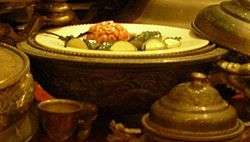Monkey brains

Monkey brains is a dish consisting of, at least partially, the brain of some species of monkey or ape. In Western popular culture, its consumption is repeatedly portrayed and debated, often in the context of portraying exotic cultures as exceptionally cruel, callous, and/or strange.[1]
Consumption
In the Gorilla Journal Angela Meder described due to personal communication with Hecketsweiler the Anyang tribe of Cameroon used to practice a tradition in which a new tribal chief would consume the brain of a hunted gorilla while another senior member of the tribe would eat the heart. For other members the killing of a gorilla was forbidden and sentenced. This tradition was reported as vanishing in 1999.[2]
While they have been eaten in the wild, and may have been served at the Manchu Han Imperial Feast, it is unclear whether monkey brains have ever been served in a restaurant. Confusion may have arisen from the fact that Chinese language term "Monkey Head" (猴頭) is also used to refer to what is known in English as the Lion's Mane Mushroom.[3] In 1998, Apple Daily in Hong Kong printed pictures allegedly showing the practice; it is the only newspaper ever to have done so.[4]
It is not only humans who eat the brains of monkeys. Both extant species of chimpanzee are known to eat the brains of monkeys which provide fat in their diet.[5]
Depiction in media
Perhaps the most notorious depiction of the consumption of monkey's brains is from the 1978 mondo film Faces of Death, directed by John Alan Schwartz. The scene depicts a restaurant with a Middle Eastern theme, including harem dancers, where American tourists are seated around a specially-designed table. A server brings out a live monkey which is enclosed in a central cage in such a manner that its head is all that is exposed. Hammers are then distributed to the restaurant patrons, who proceed to hit the monkey in the head until it dies. The server then cuts open the skull to scoop out the monkey's brains directly onto the plates of the customers. Like many of the other scenes in the film, Schwartz would later admit that the scene was faked, revealing that the hammers were foam (so as not to harm the actual monkey involved) and a fake monkey head filled with gelatin, red food coloring, and cauliflower to simulate brains was substituted for the more gruesome scenes. However, the scene popularized the rumors of the consumption of live monkey's brains.[6]
The consumption of monkey brains is also depicted in the 1984 movie Indiana Jones and the Temple of Doom (in which "chilled" monkey brains are served as dessert in Pankot Palace) and the 1985 comedy film Clue (in which it is claimed that "monkey's brains, though popular in Cantonese cuisine, are not often to be found in Washington, D.C.").
Health risks to humans
Consuming the brain and other nerve tissue of animals may be hazardous to health.[7] Brain consumption can result in contracting fatal transmissible spongiform encephalopathies such as variant Creutzfeldt–Jakob disease and other prion diseases in humans.[8]
Notes
- ↑ "Taboo Table Offerings - The Intricacies of Intercultural Menu Planning".
- ↑ Meder, Angela. "Gorillas in African Culture and Medicine" (PDF). Gorilla Journal. Extract from No. 18. June 1999. Retrieved 2014-09-22.
- ↑ http://www.japantimes.co.jp/community/2002/08/08/issues/debunking-strange-asian-myths-part-ii/
- ↑ Article October 21, 1998. Archived 6 March 2013 at the Wayback Machine.
- ↑ Clarke, Bella (2005). "Review of The Madness of Adam and Eve: How Schizophrenia Shaped Humanity". Human Given magazine. Retrieved 2006-11-04.
- ↑ Hickey, Brian (2012). ""Cut Back To A Wide Shot. Open The Skull": The Faces Of Death Guy Looks Back". Deadspin. Retrieved 2015-03-27.
- ↑ Dorfman, Kelly. "Nutritional Summary: Notes Taken From a Recent Autism Society Meeting". Diet and Autism. Retrieved 14 October 2005.
- ↑ Collinge, John (2001). "Prion diseases of humans and animals: their causes and molecular basis". Annual Review of Neuroscience. 24: 519–50. doi:10.1146/annurev.neuro.24.1.519. PMID 11283320.
References
- Live Monkey Brains on maxent.org – an extensive, critical, annotated examination of the legend
- Golden monkeys hope for survival in 'Year of Monkey'